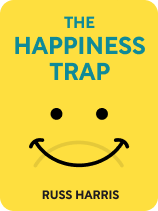

This article is an excerpt from the Shortform book guide to "The Happiness Trap" by Russ Harris. Shortform has the world's best summaries and analyses of books you should be reading.
Like this article? Sign up for a free trial here .
Are humans meant to be happy? What’s wrong with treating happiness as the norm and unhappiness as a problem?
There is a tacit assumption in our society that humans are meant to be happy. One consequence of this idea is that there is something wrong with being unhappy or experiencing psychological distress.
Here is why there is nothing wrong with being unhappy.
The Happiness Myth
The idea that humans are meant to be happy suggests something is wrong with anyone who is unhappy or experiences psychological distress. We may characterize an unhappy person as “weak.” This is the underlying premise when one person tells another to “toughen up,” as though emotions were a kind of threat that can simply be faced down and defeated (and happiness floods into the gap left by the banished emotion, says the myth).
Social media reinforces this idea by providing a platform where people can display only the best parts of their lives, which give the impression of maximum happiness. It’s easy to look at these projections of other people’s happiness and feel that your life doesn’t measure up. Some people then conclude that there must be something wrong with them.
However, because humans are not, in fact, naturally happy, there’s nothing inherently wrong with being unhappy.
| Happiness—and Unhappiness—Are Essential to Motivation Although many scientists agree that the human brain is not wired to be consistently happy, happiness does play an important role in human motivation. A 1950s study, researchers implanted electrodes in rats’ brains that allowed the animals to push a lever and get a pulse of stimulation to their brains’ pleasure centers. The rats became so obsessed with the pleasure stimulation that they didn’t pause to eat, drink, or sleep. The dopamine hits that fueled the rats’ obsession also feed drug addiction. The brain is wired to get these dopamine bursts from external rewards—like money and material goods—more than intrinsic rewards, like contentment. The catch: The dopamine surge from external rewards is more short-lived, creating the unhappiness that motivates us to pursue more happiness. Evolutionary psychologists argue that this unhappiness was key to our ancient ancestors’ survival because it helped them remain vigilant to threats and motivated to continually progress. |
The Harms of Treating Unhappiness as a Problem
Research has shown that this idea—that being unhappy means that there’s something wrong with you—is misguided. Furthermore, actually treating your negative thoughts and feelings as a problem can create secondary emotions, such as shame and guilt, that intensify your psychological suffering.
Despite this, modern psychologists consider some typical signs of unhappiness when diagnosing psychiatric disorders. For instance, symptoms of depression include feelings of sadness, angry outbursts, and anxiety. In order to diagnose an individual with depression, these symptoms have to be so overwhelming that they affect the individual’s ability to function in society—but even for individuals without diagnosed depression, these symptoms are pathologized (or linked to mental illness) and regarded as potentially problematic.
On the other hand, some experts argue that depression is an evolutionary adaptation meant to trigger social support, among other purposes. According to this hypothesis, diagnosing and treating depression does not worsen the problem—rather, those are modern forms of help that depressive symptoms exist to elicit.

———End of Preview———
Like what you just read? Read the rest of the world's best book summary and analysis of Russ Harris's "The Happiness Trap" at Shortform .
Here's what you'll find in our full The Happiness Trap summary :
- Why trying to be happy is making you unhappy
- How to practice ACT, or Acceptance and Commitment Therapy, to become happier
- How to develop “psychological flexibility” toward negative feelings instead of eliminating them






